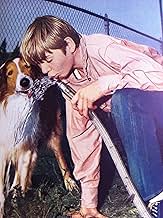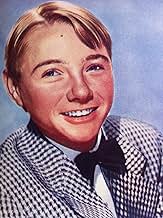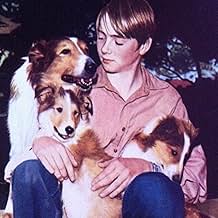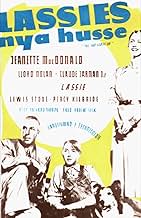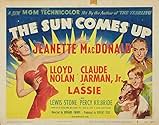Set in the rural south of the United States, a bereaved war widow learns to to put aside her bitterness and grief as she grows to love a young orphan boy and the dog that belonged to her lat... Read allSet in the rural south of the United States, a bereaved war widow learns to to put aside her bitterness and grief as she grows to love a young orphan boy and the dog that belonged to her late son. Punctuated with song-filled interludes.Set in the rural south of the United States, a bereaved war widow learns to to put aside her bitterness and grief as she grows to love a young orphan boy and the dog that belonged to her late son. Punctuated with song-filled interludes.
Ed Agresti
- Musician
- (uncredited)
Jessie Arnold
- Townswoman at Fire
- (uncredited)
Charles Bates
- Orphan
- (uncredited)
Bobby Beyers
- Orphan
- (uncredited)
Barbara Billingsley
- Nurse
- (uncredited)
Paul E. Burns
- Dr. Sample
- (uncredited)
John Butler
- Hotel Attendant
- (uncredited)
Featured reviews
Even if you don't like Jeanette McDonald, and even if you don't like child actors, and even if you don't like Lassie, do yourself a favor and rent The Sun Comes Up just to listen to the main theme during the opening credits. André Previn earned a well-deserved Rag nomination for his first film composition. It's such a beautiful, layered theme that sounds exactly as it's supposed to. It sounds like a sunrise, the promise of a brighter future, and a deep inhalation after years of shallow breathing.
If you want to watch more than the opening credits, you'll get to see Jeanette McDonald in a drama where she barely sings. She starts the movie off as a successful performer, but when her young son is accidentally killed, she tells her manager, Lewis Stone, that she's going to retire and retreat into the country. She packs up her car and her grief and drives to a small mountain town where she can hopefully start over. What she doesn't yet realize is that in a small town, no one leaves you alone! The owner of the one general store, Percy Kilbride, is extremely nosy, a confusing Margaret Hamilton wants to be her friend, and the young errand boy, Claude Jarman Jr., who grows attached to her dog doesn't let her harden her heart as she'd intended.
I didn't really know what to expect out of this movie, but it was pretty enjoyable. My favorite scene was when Jeanette leaves for the countryside. She's left her son's dog, Lassie, behind because it would be too painful to continue to live with her and show her affection; her son was hit by a car while trying to get Lassie out of the middle of the road. But Lassie's lonely and confused too, and it might be some sort of comfort to love who her son loved. Jeanette's very conflicted, and it's a really powerful scene.
I kept waiting for Lloyd Nolan to show up, since he got such a high billing, but he's hardly in the movie. Instead of a romance where a mother can only move on from her tragedy by falling in love, Jeanette grows in other ways. Give this one a shot if it sounds interesting. It gets a bit corny in some parts, but keep in mind it is a Lassie movie. It's supposed to be a little corny.
If you want to watch more than the opening credits, you'll get to see Jeanette McDonald in a drama where she barely sings. She starts the movie off as a successful performer, but when her young son is accidentally killed, she tells her manager, Lewis Stone, that she's going to retire and retreat into the country. She packs up her car and her grief and drives to a small mountain town where she can hopefully start over. What she doesn't yet realize is that in a small town, no one leaves you alone! The owner of the one general store, Percy Kilbride, is extremely nosy, a confusing Margaret Hamilton wants to be her friend, and the young errand boy, Claude Jarman Jr., who grows attached to her dog doesn't let her harden her heart as she'd intended.
I didn't really know what to expect out of this movie, but it was pretty enjoyable. My favorite scene was when Jeanette leaves for the countryside. She's left her son's dog, Lassie, behind because it would be too painful to continue to live with her and show her affection; her son was hit by a car while trying to get Lassie out of the middle of the road. But Lassie's lonely and confused too, and it might be some sort of comfort to love who her son loved. Jeanette's very conflicted, and it's a really powerful scene.
I kept waiting for Lloyd Nolan to show up, since he got such a high billing, but he's hardly in the movie. Instead of a romance where a mother can only move on from her tragedy by falling in love, Jeanette grows in other ways. Give this one a shot if it sounds interesting. It gets a bit corny in some parts, but keep in mind it is a Lassie movie. It's supposed to be a little corny.
Though she didn't intend The Sun Comes Up to be her final film, it turned out that way for Jeanette MacDonald. In this movie she plays, what else, a concert singer who is a war widow. After a few years of devoting herself to raising her only son, Dwayne Hickman, MacDonald is encouraged by her manager Lewis Stone to go back to the concert stage.
She goes back and becomes a great success in her comeback. But after the concert she sees her son run down by a truck as he was trying to save their collie Lassie from the same fate.
That just about destroys her and who could blame her for wanting to get away from it all. She rents an unused house deep in the Appalachians in North Carolina that's owned by Lloyd Nolan. She and Lassie go to live there and get involved with a group of kids from the county orphanage. Especially one young man, Claude Jarman, Jr., who reminds her of her late son.
Jeanette gets some good opera and concert material to sing, items that were staples in her real concerts. The highlights for me are Un Bel Di from Madame Butterfly and Romance.
And she gets her most cooperative co-star ever in Lassie. The beloved collie pulls off quite a rescue in the climax, but didn't steal any scenes from Jeanette MacDonald.
She never planned that The Sun Comes Up would be her last film. She had a lot of ambitions to return to the screen. During the Fifties she did The King and I in summer stock and hoped to be cast in the film adaption as Anna Leonowens. I think the part would have suited her perfectly and she wouldn't have to have been dubbed as Deborah Kerr was.
And one part she really wanted was as the Mother Abbess in The Sound of Music. She loved the song Climb Every Mountain. But by the time the film version of Sound of Music was being cast, Jeanette's health was failing.
Still The Sun Comes Up is a fine family film and a fitting end for a screen legend.
She goes back and becomes a great success in her comeback. But after the concert she sees her son run down by a truck as he was trying to save their collie Lassie from the same fate.
That just about destroys her and who could blame her for wanting to get away from it all. She rents an unused house deep in the Appalachians in North Carolina that's owned by Lloyd Nolan. She and Lassie go to live there and get involved with a group of kids from the county orphanage. Especially one young man, Claude Jarman, Jr., who reminds her of her late son.
Jeanette gets some good opera and concert material to sing, items that were staples in her real concerts. The highlights for me are Un Bel Di from Madame Butterfly and Romance.
And she gets her most cooperative co-star ever in Lassie. The beloved collie pulls off quite a rescue in the climax, but didn't steal any scenes from Jeanette MacDonald.
She never planned that The Sun Comes Up would be her last film. She had a lot of ambitions to return to the screen. During the Fifties she did The King and I in summer stock and hoped to be cast in the film adaption as Anna Leonowens. I think the part would have suited her perfectly and she wouldn't have to have been dubbed as Deborah Kerr was.
And one part she really wanted was as the Mother Abbess in The Sound of Music. She loved the song Climb Every Mountain. But by the time the film version of Sound of Music was being cast, Jeanette's health was failing.
Still The Sun Comes Up is a fine family film and a fitting end for a screen legend.
Nice, simple family film, a bit dated but still with enough charm and humor to make it agreeable--based on a novel by Marjorie Kinnan Rawlings, author of 'The Yearling'. Jeanette has her bitterness melted by Claude Jarman, Jr. and Lassie when she decides to retreat to the country to forget about the death of her son. An above-average Lassie film with a rather predictable ending after a tense fire sequence in which he rescues Claude Jarman, Jr. from a burning loft. A few nice songs by Jeanette, beautiful settings and some amusing performances by Percy Kilbride, Margaret Hamilton and others. Lloyd Nolan turns up for a cameo role. Pleasant entertainment. The blurb on the VHS copy I have cites a quote from the N.Y. Times which is so accurate: "Simple and sweet...Jeanette MacDonald has never looked lovelier."
They just don't make them like this anymore. I really liked this old movie. A movie of love and loss and moving on. The setting is great a place in the mountains. Wonderful main characters and supporting characters that make up the quirky country folk. This movie tugs at your heart strings. Wonderful performances by Jeanette MacDonald, Percy Kilbride and Claude Jarman Jr, not to mention Lassie! I wish there were more wholesome films like this. These old movies stand on their own without digitalized effects and profanity so common to new Hollywood. Jeanette MacDonald had such a beautiful voice. Give me non-enhanced sentimental movies any day! Put on your pjs and grab the popcorn and Kleenex this is a great movie for a rainy day when you don't want over the top action.
This film was Jeanette MacDonald's last film. And, considering it's a nice little family movie, she went out in style.
Helen is distraught. Her son has just died and she has decided to retreat to the countryside to try to forget. This is made tougher because the boy's dog refuses to leave her and she reluctantly takes the dog along with her. Through the course of the movie, Helen becomes friends with an orphan boy, Jerry (Claude Jarmin Jr.) and the woman who wants to be alone and forget soon learns to live again.
This film is less a Lassie film than most. Sure, the dog's important to the story...but the humans are more important and he's more a supporting player. Overall, very engaging and a nice story that you are sure to enjoy....and made with the usual MGM style and flair.
Helen is distraught. Her son has just died and she has decided to retreat to the countryside to try to forget. This is made tougher because the boy's dog refuses to leave her and she reluctantly takes the dog along with her. Through the course of the movie, Helen becomes friends with an orphan boy, Jerry (Claude Jarmin Jr.) and the woman who wants to be alone and forget soon learns to live again.
This film is less a Lassie film than most. Sure, the dog's important to the story...but the humans are more important and he's more a supporting player. Overall, very engaging and a nice story that you are sure to enjoy....and made with the usual MGM style and flair.
Did you know
- TriviaThe Sun Comes Up (1949) is mainly based on the 1936 short story "A Mother in Mannville" by Marjorie Kinnan Rawlings. According to the University of South Carolina Libraries description of Rawlings' works, in 1946 MGM asked Rawlings to do a story that could star Lassie with Claude Jarman Jr.. Rawlings started with her 1936 short story "A Mother in Mannville." MGM bought the rights to Rawlings' unpublished story "A Family for Jock," re-titled it "Mountain Prelude," and sold the literary rights to The Saturday Evening Post. The story appeared The Post as a six-part serial during April 26 to May 31, 1947. But it has never been published in novel form.
- GoofsWhen Jerry finally decides to go play with Lassie, we can hear someone off-screen give Lassie a command. Right after Jerry says,"Let's have fun now," and hugs Lassie, a man's voice clearly speaks a word off-camera, and Lassie looks in that direction before running off with the boy.
- SoundtracksUn Bel Di
(uncredited)
from "Madama Butterfly"
Music by Giacomo Puccini
Libretto by Luigi Illica and Giuseppe Giacosa
Sung by Jeanette MacDonald
Details
- Release date
- Country of origin
- Language
- Also known as
- Prolećno sunce
- Filming locations
- Production company
- See more company credits at IMDbPro
- Runtime
- 1h 33m(93 min)
- Aspect ratio
- 1.37 : 1
Contribute to this page
Suggest an edit or add missing content


